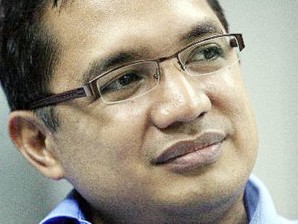Check scam an inside job, says lawmker
“This is an inside job,” said Bayan Muna party-list Representative Teodoro Casiño.
Casiño and Bayan Muna party-list colleague Neri Javier Colmenares expressed fear that a Commission on Human Rights (CHR) investigation into the reported cases of fake claimants to the compensation fund for human rights victims of the Marcos regime “may be tainted considering that insiders from the agency may be involved in the scam.”
The two lawmakers said they would file a resolution asking the House committee on human rights to conduct its own investigation.
“Of course, the CHR has the prerogative to probe the case and submit their findings to Congress but it may not be enough because from all indications this is an inside job,” Casiño said.
“So regardless of a CHR probe, Congress should also investigate. We will file the resolution on Tuesday and ask the committee to have a speedy probe and to have a report ready on Human Rights Day on December 10,” he said.
Article continues after this advertisementThe two party-list lawmakers said they were alarmed when CHR Chairperson Etta Rosales first publicly announced that she would investigate the matter in her “personal capacity” and not through the CHR.
Article continues after this advertisementColmenares questioned how the fake claimants were able to access the list of victims when the list was closely guarded by lawyers Robert Swift and Rod Domingo and the CHR.
Personally distributed
“How did they get the checks when these were personally distributed by counsels Swift and Domingo?” asked Colmenares, himself a compensation beneficiary.
He said the syndicate members may have contacts in the CHR and with the lawyers themselves.
Casiño said the CHR, Swift and Domingo should be made accountable for the fiasco.
On Friday, the Philippine National Police-Criminal Investigation and Detection Group (CIDG) busted a syndicate of fake claimants of compensation for victims of Marcos’ human rights abuses following the arrest of eight of its alleged members in Quezon City.
In favor of victims
Police Director Samuel D. Pagdilao Jr., CIDG chief said the suspects were caught encashing RCBC bank checks in the amount of $1,000 each.
The checks were drawn from a $10-million compensation fund set by a United States court in favor of some 7,500 victims of human rights abuses of Marcos.
Police were reportedly looking into the connection of Edward Santiago and his wife Marlene, the alleged masterminds, to the CHR and the lawyers of the claimants.
Domingo had admitted personally knowing the Santiagos who he said helped establish the identities of the Marcos victims.
Rosales said she doubted Domingo had links to the syndicate which police said recruited senior citizens in the slums to pose as legitimate victims.
Domingo, who represented more than 7,000 victims in a successful class suit before a US court, was riled by reports that initially tagged him as one of the respondents in the fraud case, said Rosales.
“I’ve been with him on this for, how long, 16 years. The money just came in. I don’t think he can be involved in a syndicate,” Rosales, herself a martial law victim, said by phone.
“I told him he should not be so angry if he had nothing to do with it, and if at all, we should vent our anger on the fraud that has happened,” she said.
Fake IDs
The impostors, armed with fake postal IDs with the names of legitimate victims and their pictures on them, encashed checks under the account name “RA Swift FAO Human Rights Case,” and delivered the money to the Santiagos, who paid them P1,500 each.
Rosales said the commission would open its own investigation into the fraud and she would ask Domingo to help out.
“He should help us get to the bottom of the whole thing,” she said. “We’ve already talked. I said, `let’s get to the bottom of the case’.”
She said she had directed the investigating team to question the suspects—how they managed to obtain a list of 40 genuine claimants and genuine checks.
